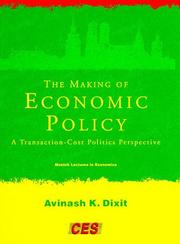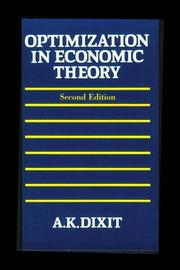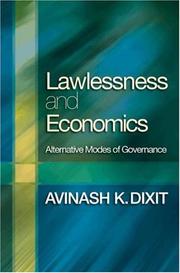| Listing 1 - 10 of 15 | << page >> |
Sort by
|
Book
Year: 2014 Publisher: Washington, D.C., The World Bank,
Abstract | Keywords | Export | Availability | Bookmark
 Loading...
Loading...Choose an application
- Reference Manager
- EndNote
- RefWorks (Direct export to RefWorks)
This paper considers the possibility of collective action by the business community to counter corruption in the award of government licenses and contracts. The analogy is with contract enforcement institutions studied by economic historians and contract law scholars. The institution in this context comprises a no-bribery norm, a community system to detect violations, and a multilateral ostracism penalty upon conviction in a community tribunal. The requirements such an institution must meet if it is to be effective are analyzed. It is shown that an institution of sufficient quality-combining probability of correct detection and severity of punishment-can eliminate bribery. If the private institution is not sufficiently good, then in conjunction with the state's formal apparatus it reduces the level of bribes demanded, but increases the probability of winning the license or contract through bribery. An improvement in the government's formal anti-corruption mechanism, holding the private institution constant, reduces both the level of bribes and the probability of success through bribery. The two institutions together are shown to achieve substantially better outcomes than either can on its own.
Anticorruption --- Business Community --- Corruption & Anticorruption Law --- Crime and Society --- Cultural Issues --- E-Business --- Law and Development --- Multilateral Ostracism Penalty --- Private Sector Development --- Public Sector Corruption and Anticorruption Measure --- Public Sector Development --- Social Accountability --- Social Development
Book
ISBN: 9780199689378 0199689377 Year: 2014 Publisher: Oxford Oxford University Press
Abstract | Keywords | Export | Availability | Bookmark
 Loading...
Loading...Choose an application
- Reference Manager
- EndNote
- RefWorks (Direct export to RefWorks)
Microeconomics --- Microeconomics. --- 330.00 --- Price theory --- Economics --- Economische en sociale theorieën: algemeenheden. --- internationalisering --- micro-economie --- Economische en sociale theorieën: algemeenheden

ISBN: 0262041553 0585028923 9780585028927 9780262271790 0262271796 9780262041553 Year: 1996 Publisher: Cambridge (MA) ; London : M.I.T. Press,
Abstract | Keywords | Export | Availability | Bookmark
 Loading...
Loading...Choose an application
- Reference Manager
- EndNote
- RefWorks (Direct export to RefWorks)
Economic policy --- Transaction costs --- Frais de transaction --- Transaction costs. --- Economic policy. --- Politique économique --- 338.9 --- #abib:aleo --- 321.2 --- 331.21 --- AA / International- internationaal --- Economic nationalism --- Economic planning --- National planning --- State planning --- Economisch beleid van de overheid --- Geschiedenis van de demografie --- Cost --- Externalities (Economics) --- Right of property --- Economics --- Planning --- National security --- Social policy

ISBN: 0198772106 0198772114 9780198772101 9780198772118 Year: 1990 Publisher: Oxford : Oxford University Press,
Abstract | Keywords | Export | Availability | Bookmark
 Loading...
Loading...Choose an application
- Reference Manager
- EndNote
- RefWorks (Direct export to RefWorks)
AA / International- internationaal --- 305.976 --- 330.00 --- 330.3 --- Algoritmen. Optimisatie. --- Economische en sociale theorieën: algemeenheden. --- Methode in staathuishoudkunde. Statische, dynamische economie. Modellen. Experimental economics. --- Quantitative methods (economics) --- Economics, Mathematical --- Mathematical optimization --- Algoritmen. Optimisatie --- Economische en sociale theorieën: algemeenheden --- Methode in staathuishoudkunde. Statische, dynamische economie. Modellen. Experimental economics
Book
ISBN: 1462312632 1455203092 Year: 1990 Publisher: [Place of publication not identified] International Monetary Fund
Abstract | Keywords | Export | Availability | Bookmark
 Loading...
Loading...Choose an application
- Reference Manager
- EndNote
- RefWorks (Direct export to RefWorks)
Book
Abstract | Keywords | Export | Availability | Bookmark
 Loading...
Loading...Choose an application
- Reference Manager
- EndNote
- RefWorks (Direct export to RefWorks)
The paper argues that to achieve compliance of firms with regulations such as product quality or environmental or health standards it is better to have industries with a few large corporations than numerous small firms. A model is constructed to show that limited liability constraints bind more easily in competitive industries, making it harder to impose sufficiently severe penalties and costlier to send sufficient monitors. Having large corporations allows the government effectively to delegate some of its monitoring functions to the managers of the corporation. The tradeoff between this issue and the usual argument in favor of competition is considered.
Book
Year: 1976 Publisher: London Oxford University Press
Abstract | Keywords | Export | Availability | Bookmark
 Loading...
Loading...Choose an application
- Reference Manager
- EndNote
- RefWorks (Direct export to RefWorks)

ISBN: 0691114862 0691130345 9786613303332 1283303337 1400841372 9780691114866 9781400841370 9780691130347 Year: 2004 Publisher: Princeton, N.J. : Princeton University Press,
Abstract | Keywords | Export | Availability | Bookmark
 Loading...
Loading...Choose an application
- Reference Manager
- EndNote
- RefWorks (Direct export to RefWorks)
How can property rights be protected and contracts be enforced in countries where the rule of law is ineffective or absent? How can firms from advanced market economies do business in such circumstances? In Lawlessness and Economics, Avinash Dixit examines the theory of private institutions that transcend or supplement weak economic governance from the state. In much of the world and through much of history, private mechanisms--such as long-term relationships, arbitration, social networks to disseminate information and norms to impose sanctions, and for-profit enforcement services--have grown up in place of formal, state-governed institutions. Even in countries with strong legal systems, many of these mechanisms continue under the shadow of the law. Numerous case studies and empirical investigations have demonstrated the variety, importance, and merits, and drawbacks of such institutions. This book builds on these studies and constructs a toolkit of theoretical models to analyze them. The models shed new conceptual light on the different modes of governance, and deepen our understanding of the interaction of the alternative institutions with each other and with the government's law. For example, one model explains the limit on the size of social networks and illuminates problems in the transition to more formal legal systems as economies grow beyond this limit. Other models explain why for-profit enforcement is inefficient. The models also help us understand why state law dovetails with some non-state institutions and collides with others. This can help less-developed countries and transition economies devise better processes for the introduction or reform of their formal legal systems.
Economic policy --- Corporate governance --- Contracts --- Right of property --- Corporation law --- Business enterprises --- International Cooperation --- Law and legislation --- Developing countries --- Contracts. --- Corporate governance. --- Corporation law. --- Economic policy. --- International cooperation. --- Right of property. --- Law and legislation. --- Economic analysis of law --- Economic order --- Politique économique --- Gouvernement d'entreprise --- Contrats --- Droit de propriété --- Sociétés --- Entreprises --- Coopération internationale --- Droit --- Pays en développement --- Business organizations --- Businesses --- Companies --- Enterprises --- Firms --- Organizations, Business --- Business --- Company law --- Corporate law --- Corporations --- Law, Corporation --- Trusts, Industrial --- Commercial law --- Ownership of property --- Private ownership of property, Right of --- Private property, Right of --- Property, Right of --- Property rights --- Right of private ownership of property --- Right of private property --- Right to property --- Civil rights --- Property --- Agreements --- Contract law --- Contractual limitations --- Limitations, Contractual --- Legal instruments --- Obligations (Law) --- Juristic acts --- Liberty of contract --- Third parties (Law) --- Governance, Corporate --- Industrial management --- Directors of corporations --- Cooperation, International --- Global governance --- Institutions, International --- Interdependence of nations --- International institutions --- World order --- Cooperation --- International relations --- International organization --- Economic nationalism --- Economic planning --- National planning --- State planning --- Economics --- Planning --- National security --- Social policy --- Law --- International cooperation --- 330.1 --- Ea1 --- 330.52 --- AA / International- internationaal --- 338.22 --- 338.22 Economische organisatieleer. Economisch beleid. Economische politiek --- Economische organisatieleer. Economisch beleid. Economische politiek --- Liberaal systeem. Neo-liberalisme. Theorie van de onderhandeling --- Business enterprises - Law and legislation --- Corporate governance - Developing countries --- Contracts - Developing countries --- Right of property - Developing countries --- Corporation law - Developing countries --- Business enterprises - Law and legislation - Developing countries --- Developing countries - Economic policy
Book
ISBN: 1462358039 1455211168 Year: 1990 Publisher: [Place of publication not identified] International Monetary Fund
Abstract | Keywords | Export | Availability | Bookmark
 Loading...
Loading...Choose an application
- Reference Manager
- EndNote
- RefWorks (Direct export to RefWorks)
Book
Abstract | Keywords | Export | Availability | Bookmark
 Loading...
Loading...Choose an application
- Reference Manager
- EndNote
- RefWorks (Direct export to RefWorks)
"This paper provides a review of the contradictions and conflicts in the literature on economic governance and sketches an approach to use some of the conceptual and empirical findings from that literature for development policy. The literature offers conflicting conclusions on big questions: whether history and geography preordain a country's economic fate, whether democracy or authoritarianism promotes growth; whether informal or formal mechanisms are best; whether "big bang" or gradual transitions promote growth; and whether disasters and demographics are stumbling blocks or stepping stones. The author finds recipes for success that are infeasible, contradictory and shifting, and that ignore the role of luck in development policy. While the researcher may ask, "What creates success on average across countries?" the policymaker needs to know, "What is going wrong in this country and how can we put it right?" The author suggests a preliminary approach to combine the practitioner's detailed knowledge of country conditions with the broader patterns uncovered by scholars, building on "growth diagnostics" that identify binding constraints to development. But he shifts from the sequential "decision tree" framework to a more directly "diagnostic" approach that recognizes that policymakers must deal with many factors simultaneously. The framework he suggests combines empirical information on potential causes, estimates of their probabilities, and observed effects. He proposes this framework as the foundation, not for another recipe, but for a broader mode of thought to tackle the complexity and variance in development processes and patterns across countries and time-one country at a time. "--World Bank web site.
| Listing 1 - 10 of 15 | << page >> |
Sort by
|

 Search
Search Feedback
Feedback About UniCat
About UniCat  Help
Help News
News